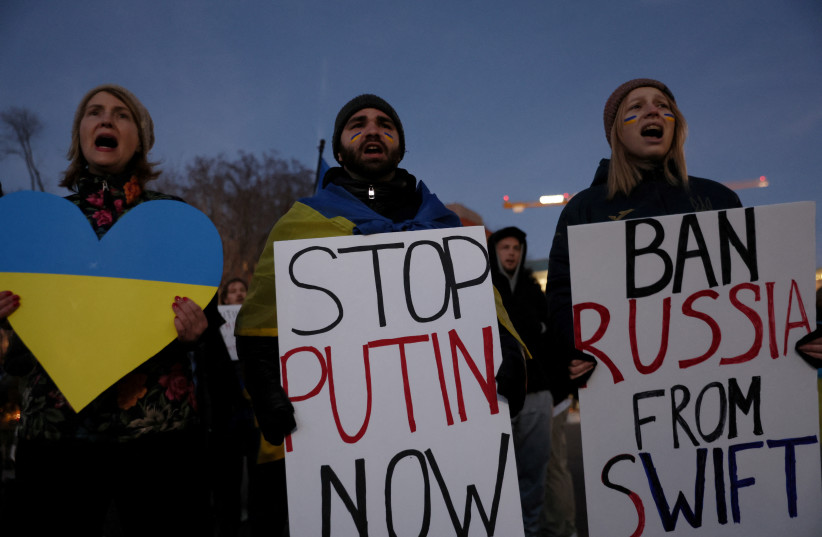Ukraine was supposed to be protected by a rules-based international order. A plethora of international laws and norms should have made the invasion of Ukraine difficult and led to real repercussions for the invader.
However, days into the invasion, there are only tentative sanctions against Russia. Many of the announced sanctions in Europe, including cutting some Russian banks out of the SWIFT money-transfer system, are still symbolic so far. Western countries fear real sanctions because of Russian threats and because they rely on Russia.
This situation is compounded by Russia having a seat on the UN Security Council, and a seat on the UN Human Rights Council. Russia is joined on the Human Rights Council by a number of countries that have among the worst human-rights records in the world.
Read more on the Russia-Ukraine War:
- Day 4 of the Russian invasion of Ukraine
- Status of negotiations between Russia and Ukraine
- 'Israel trying to maintain option to mediate between Ukraine and Russia’
- Zelensky calls on foreigners to join in war against Russia
- Snake Island soldiers who told Russian ship to 'f*** itself' may still be alive
This bizarre situation – where the groups running international bodies tend to represent opposite values than what the institution stands for – has been one of the typical features of world order for the last few decades.
It wasn’t always this way. The UN, human-rights groups and international law were all designed to provide tools for democracies to stop dictators from invading and destroying countries.

This tradition was learned from previous wars, and enshrined in the policies and concepts laid out during the wars of the 19th century and the early 20th century. The main features of the rise of fascism and the invasion of Ethiopia by Mussolini’s Italy, as well as Japan’s campaigns in China, were part of the way that countries learned the need to stand up to aggression before it got out of hand.
The lessons of appeasement led to democracies being more forthright in their demands that countries adhere to these norms. The Cold War, however, brought a litany of new abuses, and because the world was divided, it was hard for countries to agree on international norms and enforcement. The concepts laid down by US president George H.W Bush during the Gulf War were designed to resurrect the rules-based international order.
Although this international order has not been ideal, there have been attempts to make it work, like the US intervening in the Balkans in the 1990s to stop ethnic cleansing. The US stumbled during the global war on terrorism, but the pretense of international law remained.
In fact, Russia has often voiced support for these norms in places like Syria, demanding the US leave Syria and claiming that it is Russia that stands by international norms, such as sovereign states and similar concepts.
Russia has now torn up that rule book in an unprovoked attack on Ukraine. Moscow did not set any kind of ultimatum or redline before the attack. The excuse that Russia was concerned about NATO expansion holds no water because Moscow did not even try diplomacy with Ukraine. Russia simply started bombing without any warning or pretense of why it was launching an attack.
This shows that Russia did not feel a need to justify the attack, neither distributing talking points before the war to its media and embassies nor even bothering to try to explain the conflict. It doesn’t have regular press updates. This is because Russia knows it is violating international norms.
The problem for Ukraine is that these norms were supposed to protect Ukrainians. The Western countries that talk tough on sanctions, and US vows about “unprecedented” sanctions, still continue to ring hollow, because the unprecedented actions are not yet being fully taken.
The US especially seems keen to continue to work with Russia on energy issues and the Iran deal, which means the war casts a shadow over the enforcement of any issue relating to Iran. The story of “snapback” sanctions on Iran was largely a myth. Iran can keep on enriching uranium, and nothing will be done.
Unfortunately for Ukraine, the same letdown of relying on Western democracies has led to war today, much as it did in the 1930s. Whether the West can step up and give Russia some real repercussions will be key to see if this attack on Ukraine has a result that sends a message to others not to try the same thing.
